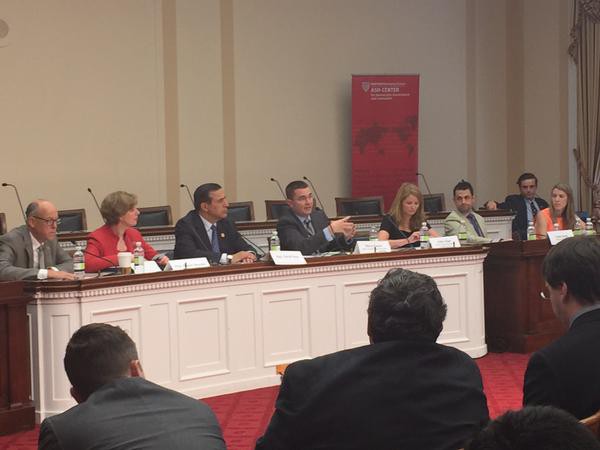
The Tuesday, May 12 #Hack4Congress awards ceremony at the House of Representatives’ majestic Judiciary Committee hearing room was the culmination of a 6 month long effort to engage technologically savvy members of the public with making Congress more open and efficient. The three winners of congressional data hackathons in Cambridge, San Francisco, and Washington, D.C. presented their projects to three members of Congress, a bipartisan array of senior congressional staff, and a packed gallery filled with journalists, advocates, staff, academics, and others.

More than 620 people and 16 members of Congress participated over the course of the hackathons, events where policy wonks and technologists who had not previously met developed web tools to address perceived problems with the way Congress works. Participants were challenged to address problems — and were provided suggested topics by members of Congress and non-governmental groups like us — in one of the following five categories.
- Improving the Lawmaking Process
- Facilitating Cross-Partisan Dialogue
- Modernizing Congressional Participation
- Closing the Representation and Trust Gaps
- Reforming Campaign Finance
Each of the three winning projects performed an extraordinary amount of work over a short period of time. It is worth checking out the presentations from the winning teams — CDash, CoalitionBuilder, CongressConnect — which are summarized here. To see a demonstration of the projects, watch this video from the awards ceremony.
• • •
Several themes emerged from the regional hackathons and awards ceremony.
First, the hackathons illustrated the significant public enthusiasm for using technology to make Congress work better. This enthusiasm for the development of congressional civictech, to use the in-vogue buzzword, should be no surprise to anyone who watches this space closely. The unique levels of complexity and institutional challenges that arise in the federal legislature have long served as a crucible for development of new technologies inside and outside government. Over the last half-decade in particular, the House of Representatives has leaped forward, and the Senate and legislative support agencies have followed, in efforts to make more data available in civic friendly formats, prompted in part by the work of our coalition.
Second, while there’s a lot of talk about state and local governments as civictech innovators, the greatest improvements in public access to information still arise from work done at the federal level. The 2009 Stimulus Act forced the states for the first time to track federal spending, which was then reported on a federal website. Federal civictech websites like GovTrack have served as a model for the updates to THOMAS (now Congress.gov) and the development of legislative information websites in the various states and around the world. The DATA Act will cause the creation of unique identifiers to track the flow of nearly all federal funds. And funding for the Government Publishing Office and its primary website FdSys effects local access to information held at federal depository libraries and online.
Third, even with all the enthusiasm, it was apparent that many people still do not know where to find federal legislative information. That’s no surprise. Publishing of congressional information developed organically, in fits and starts, in different places through the bureaucracy. It was not systematic because it had never been done before. Only in the last few years with the development of docs.house.gov,rules.house.gov, and non-governmental sites like the GitHub United States projectpage, has there been some effort to catalog and publish data in a few central locations. Most people, however, are unaware of these publishing efforts, and more needs to be done to help civic technologists find and make sense of this data.
Finally, civic technologists would benefit from guidance. Many technologists want to build things are useful, but are not sure what that is. Or they don’t understand how Congress works at a significant level of detail. Or they want to build something but don’t realize it already exists. This is where our community can help. We can connect policy experts with civic developers. We can build online resource that identify thetools that exist and data sources, list ideas for what should be built, and help people get connected into the broader community.
The OpenGov Foundation, the Ash Center at Harvard, and their civic tech partners should be applauded for hosting an incredibly successful series of events. They dovetail perfectly with the great work the House of Representatives is doing, as showcased at the recent Legislative Data and Transparency Conference. We hope there will be another formal #Hack4Congress next year and we look forward to participating.
{ Liked this? You may also like Legislative Project Ideas for Coders and Non-Coders and Electronic Toolbox for Congress }
— Written by Daniel Schuman